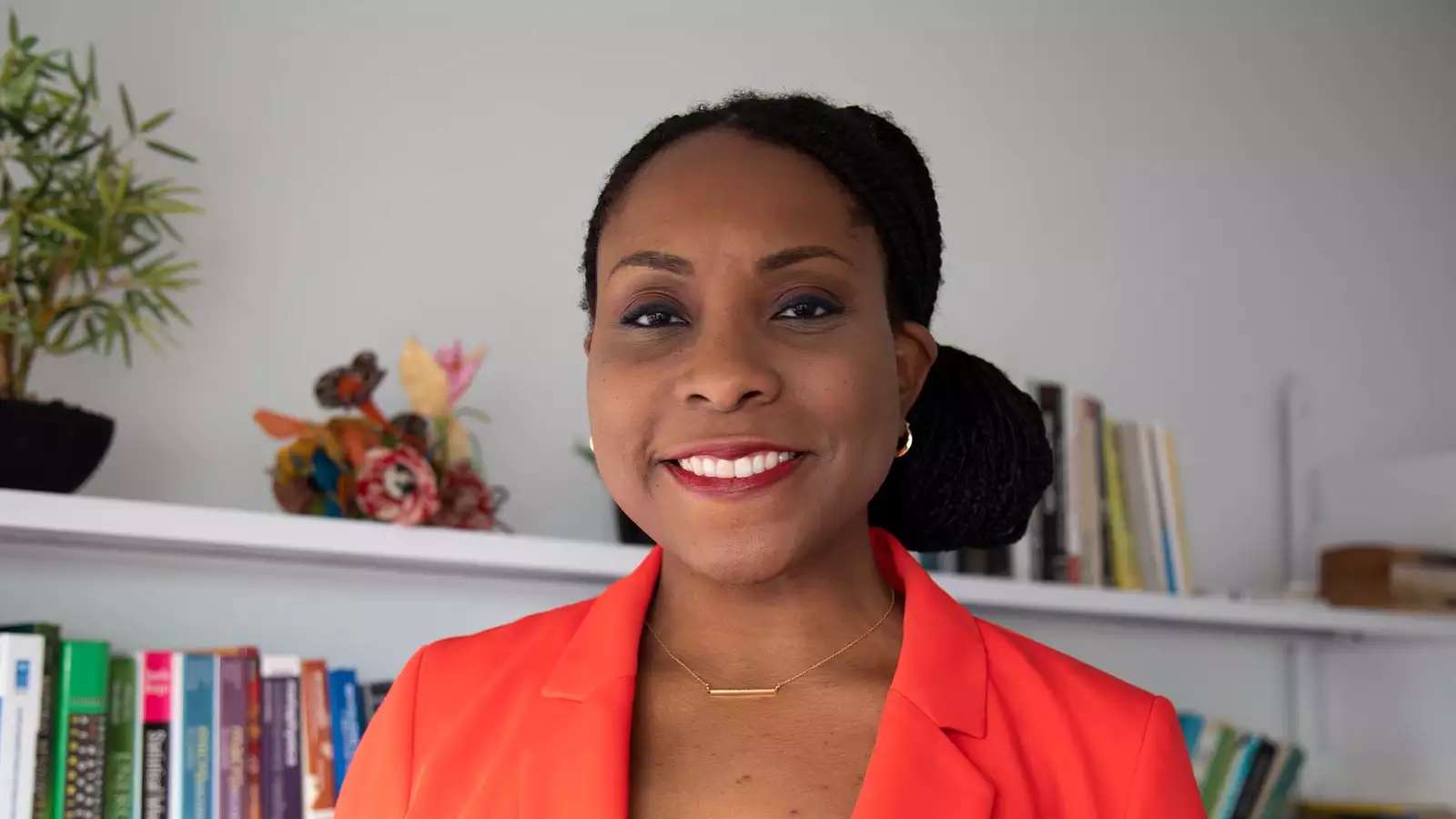
Assistant professor of economics Belinda Archibong researches development economics, political economy, economic history, and environmental economics with a focus on regional Africa. She examines the history of institutional and environmental inequality and how it impacts populations, and she has recently published research on the ways in which human capital investments and outcomes are impacted by climate and energy policy, communication interventions during COVID-19, and the economics of a post-pandemic world on Black-owned businesses.
A sought-after voice throughout 2021 on the U.S. economy’s pandemic recovery, the Brookings Institution Rubenstein Fellow also testified at Congress’ Joint Economic Committee hearing titled “Vaccinations and the Economic Recovery.” In December 2021, Archibong published a working paper and blog in Brookings on the effects of negative news reports on vaccine hesitancy during an epidemic. Even though the evidence stems from Pfizer’s meningitis drug trials done in Nigeria in 1996, the research establishes a timely throughline to the U.S.’s current COVID-19 vaccination skepticism and the effects that news reports have had on public perception, then and now.
Watch Professor Archibong's Congressional testimony, delivered on April 14, 2021, below:
To learn more about Archibong’s Brookings research and its implications for people in the U.S., read her Break This Down Q&A below.
Why did you focus on Nigeria, as opposed to another country whose citizenry may also be vaccine hesitant?
The 1996 Pfizer drug trials in Nigeria are one of the most famous, or infamous, cases of medical malpractice in recent history.
The trials came to public knowledge when a Washington Post reporter did an exposé in December 2000, alleging Pfizer’s fault in allegedly unethical — without prior informed consent of the parents and participants — drug trials of 200 children in Muslim Nigeria conducted during a meningitis epidemic. The media also reported the deaths of 11 children and the fact that multiple children may have been disabled as a result of the trials. The release of the news in 2000 led to immediate backlash and protests in Muslim states in Nigeria, with Muslim religious leaders, or imams, calling for boycotts of “Western” medicines and vaccinations, with allegations that the Pfizer incident was proof that “the West” — exemplified by institutions such as the American Pfizer company — was trying to kill Muslims with vaccines.
It’s a case that, as a Nigerian citizen growing up in Nigeria at the time, I remember hearing about as a child, and it’s one that we thought presented an informative case to study the drivers of vaccine hesitancy.
Nigeria itself, and many African countries more generally, have relatively low rates of vaccine hesitancy compared with other regions of the world. According to data from the Wellcome Global Monitor, as of 2018, the share of people who disagreed that vaccines were safe was lower in Nigeria (around 5%) than the global average (7%) or the U.S. average (11%), with France having some of the highest shares of respondents who disagreed that vaccines were safe (33%). Nigeria presents an informative region to study vaccine hesitancy since not only were the Pfizer drug trials one of the most infamous health cases in recent history, the incident also provides an example of how a previously not particularly vaccine-hesitant population can become more vaccine hesitant due to negative experiences with health institutions and negative news about vaccination.
What effect did the media and religious leaders have on Nigerian parents in 2000 and in the years after?
In our research, we found that in the aftermath of the Washington Post disclosure in 2000, Muslim mothers significantly reduced routine vaccination of children born after 2000. The reduction, a magnitude of 11% to 27% relative to the vaccination rate before the Washington Post article, included routine childhood vaccines for diseases such as tuberculosis, diphtheria, pertussis, tetanus, polio, and measles — vaccines that have been known to be safe and effective for decades. And the subsequent reduction in childhood vaccination in Nigeria, which had some of the highest polio rates in the world, has been implicated in setting back global eradication efforts by over a decade. It took federal and local authorities many years, working with local religious leaders that people trusted, to build back trust in vaccination and get more people to vaccinate their children with these routine childhood vaccines.
What are some of the most alarming aftereffects you found following the increased mistrust in vaccinations?
We found that decreased vaccination rates among children born to Muslim mothers persisted for up to 12 years after the initial disclosure of the Pfizer drug trials. Millions of people, many of them children, die each year from vaccine-preventable diseases, so the fact that this event significantly reduced child vaccination for so many years may have led to the very preventable illness and deaths of countless children.
Additionally, the Pfizer trials remain a point of tension among Muslims in Nigeria, with the specter of Muslim children’s deaths often referenced anytime health authorities attempt to conduct mass vaccination campaigns in the country — with the most recent example being efforts to vaccinate populations during the COVID-19 pandemic.
How does your research offer insight into the U.S.’s current battle over COVID-19 vaccination hesitancy and the role that media plays?
The fact that it took just a single instance of negative news about vaccination to cause many years of increased vaccine hesitancy [in Nigeria] highlights the importance of careful, ethical, and transparent practices in reporting on vaccination efforts during the COVID-19 pandemic. The current media landscape in the U.S. is incredibly polarized and fragmented, and there is a lot of disinformation out there, which has led to a lot of confusion and misinformation about vaccination during the pandemic. Federal and local governments and national agencies, such as the CDC, need to work with local institutions that people trust to communicate information about vaccination clearly, consistently, and transparently. Otherwise, it will be difficult to improve vaccine compliance and get more people to take up vaccination, which is a key health policy to reduce the spread of disease and end the pandemic.
As an economist, what was your biggest takeaway from how vaccine hesitation can affect a nation’s economy?
I am constantly thinking about the ways institutions and environment shape the incentives people face and how that in turn affects their/our decision making. Based on our research, we know that epidemics can have disastrous impacts on economic well-being, particularly for the most vulnerable populations within societies — for example, through widening gender inequality and decreasing health, education, income, and labor market outcomes for women and Black and other populations of color in the United States. Vaccination is a key policy to mitigate the spread of disease and end epidemics, and hence, increased vaccine hesitancy can lead to prolonged epidemics that are costly to populations on all the dimensions and outcomes I mentioned earlier. Both the direct health costs — through increased cases of disease among unvaccinated populations — and the indirect costs on health, education, income, employment, etc., can be higher the higher the level of vaccine hesitancy and the lower the level of vaccination among populations, especially during epidemics.
What should we know about how information can be shared and interpreted around vaccines?
I also want to highlight the importance of both information and social networks in vaccine hesitancy when negative news about vaccination spreads, as in the Nigeria case. In our research, we find that the effects of reduced vaccination of children born to Muslim mothers was strongest amongst educated mothers who were literate and hence were more likely to read the news and also among mothers who lived in minority Muslim neighborhoods. These mothers in minority Muslim neighborhoods were more likely to cleave more strongly to their religious networks — attending mosque more often and expressing higher trust in their religious leaders — than their peers living in neighborhoods where Muslims were the majority. Understanding the dynamics of how people receive information — through media sources and through their social networks — is an important part of reducing vaccine hesitancy by leveraging local community networks to provide information and build trust in vaccination efforts.


